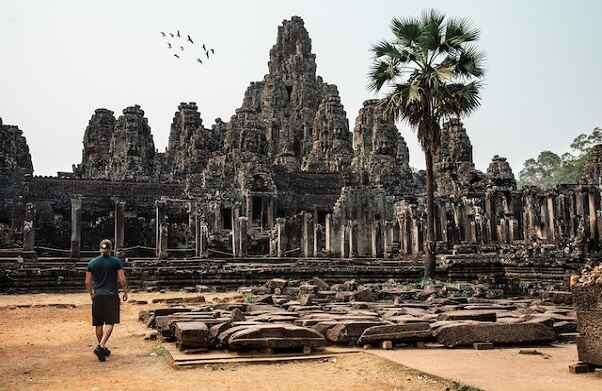
Cambodia in South East Asia is a country with history etched on stone. It’s a story of outrageous ambitions giving rise to stupefying mammoth Cambodian Hindu temples. Seldom will you find a country with such contrasting vistas of the modern and the time-warped. It was part of the mighty Khmer Empire which probably was one of the strongest Hindu kingdoms in the world at that time.
Tropical beaches, historical sites, a buzzing nightlife, and stunning countryside are all part of the Cambodia tourism experience. Every year, thousands of tourists flock to Cambodia because of its pleasant tropical weather. The chilly and dry months of November through February are some of the best for travel to Cambodia.
You can see its erstwhile grandeur in a typical Cambodia Hindu temple which will still seem majestic even in ruins. SOTC has curated holiday packages for Cambodia which can be customized as per requirement.
Though there are a plethora of temples scattered around Siem Reap. From the popular Cambodia Tamil temple to the Cambodia Vishnu temple and more, there are plenty of temples to visit in Cambodia on your trip.
Here, we’ve listed the ten most spectacular ancient temples in Cambodia that you must visit on your trip to the land.
Top 10 Ancient Temples in Cambodia To Visit
1. Angkor Wat
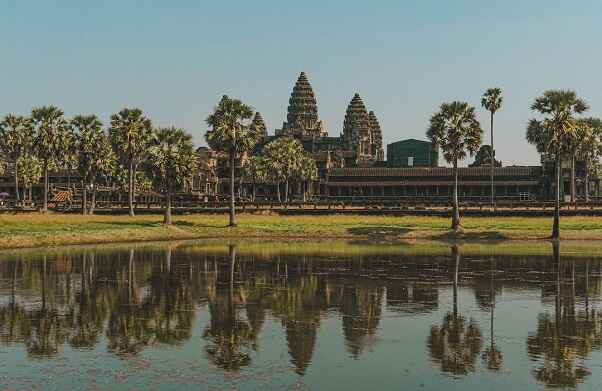
A popular Cambodia temple that attracts tourists from all across the globe is a must-visit temple on your trip. Designated as a UNESCO World Heritage site, Angkor Wat is one of the grandest structures in the world and the ultimate epitome of Khmer genius. It is not only the largest temple in Cambodia but also one of the most spectacular temples in the world. Built in the 12th century by the mighty Hindu King Suryvarman II, the complex covers a staggering area of 400 acres. known for its impressive architecture, the Cambodia temple gods are Vishnu, Brahma, and Shiva. The Angkor Wat Cambodia temple walls have many depictions of episodes from the legendary Hindu scriptures of Ramayana and Mahabharata. Surrounded by a moat, the temple can be reached via a 188-meter-long bridge. The moat symbolizes the ocean surrounding Mount Meru which as per Hindu mythology is the place where the Gods reside. The 5 towers of the temples symbolize these mountain peaks.
The temple has three huge galleries inside, each separated by paved walkways. After the invasion of the Cham army (current Vietnam), the incumbent lost faith in the Hindu Gods and put his faith in Buddhism. He created another area called Angkor Thom dedicated to religion. Angkor Wat was abandoned by the 15th century and fell into ruins. Only in the early 20th century, massive restoration works helped regain its past glory. A small reservoir in front of the temple is a photographer’s delight with the entire reflection of the temple captured in it.
2. Bayon Temple
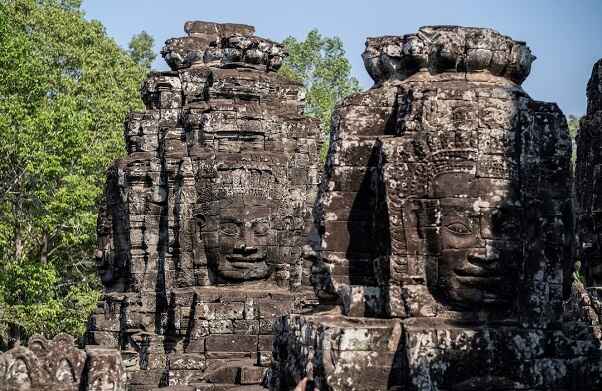
If the grandeur of Angkor Wat has surprised you, then the thousand smiling ‘Buddhesque’ faces of the Bayon Temple will intrigue you. This temple is situated at the center of Angkor Thom, the city built by King Jayavarman VII in the early 13th century. This was at the time when the Cambodian Kings had lost faith in Buddhism. The larger-than-life smiling faces at various places in the temple have two theories to them. One is the resemblance to Lord Buddha’s face of compassion. The other is the uncanny similarity to King Jayavarman’s face. Some historians believe that the King might have thought of himself as God and thus etched his face across the religious temple. There are a total of 54 towers in the temple with carvings of bas-relief visages. Many smiling faces have faded away or broken, but there are plenty of it still intact in this one-of-a-kind temple in the world.
3. Ta Prohm
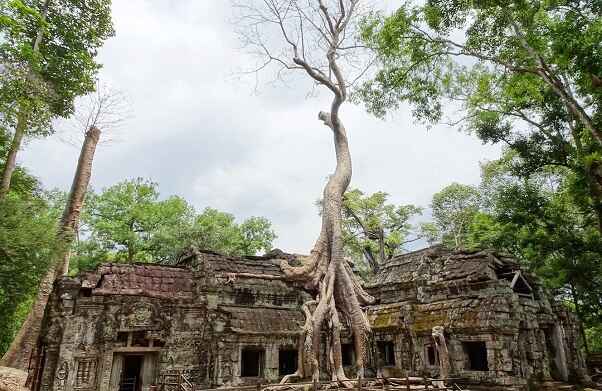
Another popular Cambodia Hindu temple to visit, you might be surprised to know that this temple was featured in the famous action-adventure movie Tomb Raider. The eerie root-infested jungle temple of Ta Prohm is one of its kind Cambodian temple. Probably one of the most photographed temples in the world, it’s a quirky example of an enchanting forest taking over man-made structures in an unimaginable manner.
Huge tree trunks sprout from arched gateways, myriad branches have made the temple walls their home and gigantic tree roots engulf the temple walls. It’s a sight out of the ordinary. Built in the late 12th century, it was known as”Rajavihara”, translating to Monastery of the King. It was dedicated to the mother of King Jayavarman VII. The entire complex is characterized by narrow passways, enclosed courtyards and winding corridors. It is right at the top of Cambodia’s most famous temples to visit.
4. Neak Pean
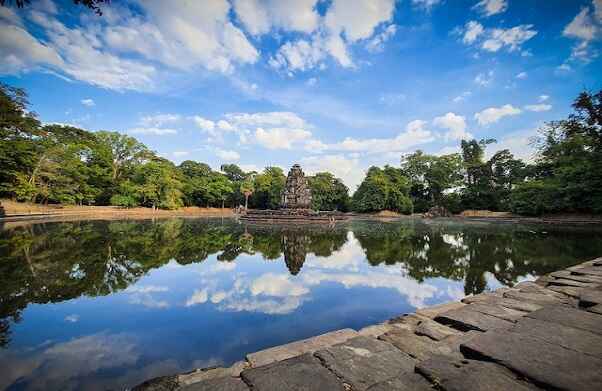
Another eccentric architecture amongst Cambodian temples is Neak Pean – the entwined Snake Temple in the middle of a water body. The small temple sits on a circular island on a circular stone base. There is no path to this Cambodian mandir. It is surrounded by broad sandstone pathways. To reach these pathways, you have to walk on a wooden plank in the middle of a large reservoir. This long beautiful plank connects the island to the mainland. During monsoons, it gets cut off from the mainland.
The surrounding water with submerged tree trunks and logs looks very picturesque. The entire complex is a collection of five ponds. The main Cambodia Hindu mandir is in the central pond which depicts Lake Anavatapta in the Himalayas. As per Buddhist scriptures, it is at the top of the universe and four major rivers of the world flow from there. King Jayavarman VII also planned it in the same way with four other ponds seemingly originating from the central one.
5. Bakong Temple
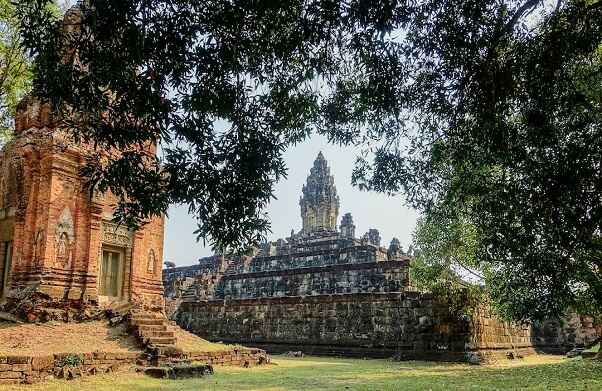
If there is one Cambodia Temple that can match Angkor Wat Cambodia in a few parameters, it is the Bakong Temple. Built in the late 9th century by King Indravarman I, it is the first temple-mountain architectural design style used on such a grand scale. It is also the first temple of the Khmer empire built of stone instead of bricks. This Cambodia Shiva Temple served as the official temple of the King. What strikes you is the dark, almost black sandstone walls of the temple which gives it a unique look. The vagaries of time have ripped the colors of the original sandstone.
The temple design is unlike any. It is made like a pyramid and surrounded by several brick towers, A single sacred enclosure is on top of the pyramid. The receding terrace-like design on its outer walls makes it resemble a stepped pyramid in Egypt. Bakong is also another great example of Cambodia’s Shiva Temple with depictions of Hindu Gods in many places.
The temples need to be seen in a particular order so that you can visit and explore most of them. The packages of SOTC include a detailed commutation plan and will ensure you have the best experience exploring the ancient structures.
6. Baphuon Temple
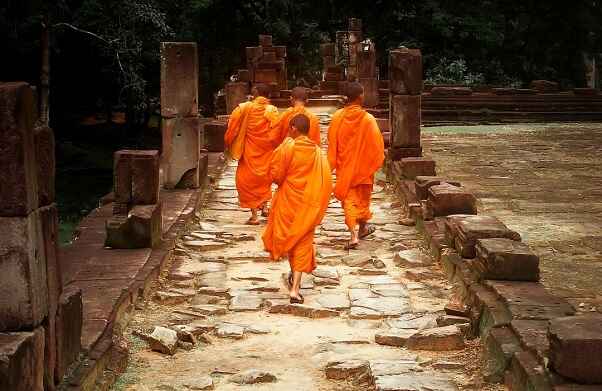
This is another Cambodia Hindu Temple that followed the temple-mountain architecture. The temple complex is almost like a palatial ground with large open areas, water bodies, and several paths around the temple. This Cambodia ka mandir is 400 meters long and more than 100 ft. high. It is by the side of Bayon Temple, though in a more ruined state.
The roof has crumbled, but it’s still a Cambodia famous temple to visit. The terrace of the temple is accessible and gives an impeccable view of the surrounding grounds. It helps you envisage the vastness of the complex. Another interesting thing about this Cambodia Temple is its design across three tiers with the structure’s height in ascending order. This place again was designated as a Cambodia Shiva Temple and later converted to preach Buddhism.
7. Banteay Kdei
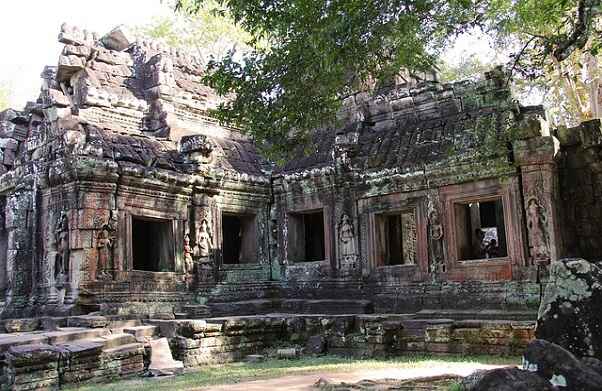
The name translates to ‘Citadel of Chambers’. Over the centuries, since its construction, this beautiful mazed structure has been the prayer place of Buddhist monks. It flourished under the rule of King Jayavarman VII and was probably vandalized by further rulers. A very intriguing finding here is the remains of 274 Buddhist statues which were found buried in a phased and particular manner. This was a new finding for any excavation ever done in Cambodia. This erstwhile monastery is a delight to explore with plenty of small symmetrical arched entrances. The entrance is a large lat layout with seemingly four gates guarded by Garuda – the mythical bird in Hinduism. This again points towards this being a Cambodia Hindu temple before being converted to a place of Buddhist worship. Cambodia temple Hindu structures like these attract people from all around the globe and are a must-visit of any Cambodia tour.
8. Pre-Rup Temple
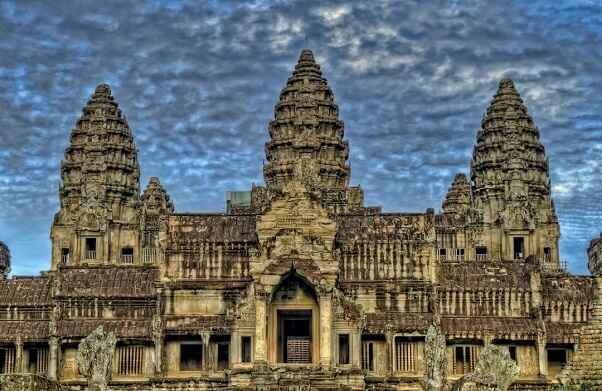
From a distance, this Cambodia temple looks like three towering giants looming over the skyline seemingly protecting something important. However, in total, there are five towers with the central one being the tallest. Construction of this Cambodia Shiva Temple dates way back to the 10th century and was the state temple of King Rajendravarman II.
You wouldn’t believe that such a huge structure had gone completely underground. It was excavated only in the 1930s. Another epitome of temple-pyramid architecture, this temple is made of brick and laterite which clearly shows from the temple’s appearance. It is built as a three-tiered pyramid with structures and statues on each level.
The central tower on the top has a small enclosure where probably the symbol of Lord Shiva – linga was enshrined. The presence of two Buddha statues in the same place now shows the transition of this region from Hinduism to Buddhism which is indicated across all the ancient structures.
9. Preah Ko
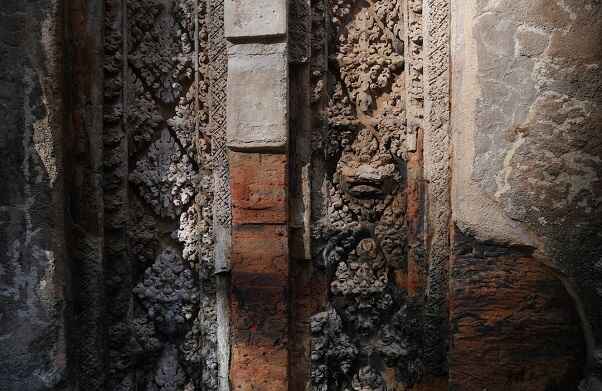
This is one of the oldest structures in Cambodia dating back to the 9th century AD. The name translates to “sacred bull” which is considered the sacred animal of Lord Shiva. It was supposed to be part of the King’s palace. The wooden palace has been engulfed by time with the remnants of the stone temple as we see it today. There is no elaborate courtyard or temple complex like other Cambodia famous temples.
Preah Ko is known for its intricate architecture. It paved the way for further exquisite temples in Angkor. Six brick towers characterize this temple. They are placed in two rows on a raised sandstone platform. The central tower has images of Lord Shiva and is a popular Cambodia Hindu temple to visit.
10. Banteay Srei
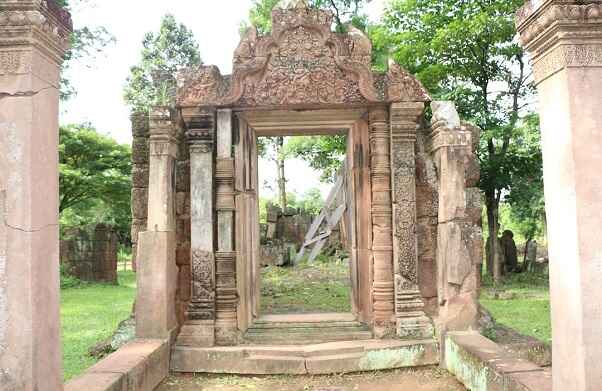
The fairytale pink sandstone temple of Banta Srei is considered to be one of the finest examples of Khmer architecture. It was built during the 10th century AD, a time when the region was witnessing a surge in temple construction dedicated to Hindu Gods. Banteay Srei’s history is a bit different from the other temples. It was probably built not as a state temple for the King but its a result of the Brahmins and priests’ lobbying to build more temples as part of the religion’s propagation.
The small size of the temple complex with the use of charming pinkish sandstone makes it unique. This rare material was precious and very hard. It is precisely the reason why Bantea Srei still retains its finesse even after millennia! This Cambodia temple gods are Shiva and Vishnu. The complex is bespattered with exquisite carvings. It is considered to be the epitome of Hindu temple art way ahead of the impressions found in Angkor Wat or Bayon Temple. It was designated as a UNESCO World Heritage site in 1992.
These were the top 10 temples to visit in Cambodia. There many places to visit in Cambodia. The ancient city of Angkor, like its puzzling temples, provides more answers about its grandeur, mystique, and relevance if one is willing to explore it at length. The Angkor region has more than 70 temples. It will be impossible to visit all of them during your visit. This list of the top 10 ancient temples of Cambodia will help you understand the country’s cultural narrative comprehensively.
To visit these spectacular temples on your trip, check out SOTC for the best-planned Cambodia packages. These packages give you a chance to explore these beautiful Cambodia temples for a memorable experience. There are several options to choose from. You can also combine Vietnam and Thailand in your itinerary and experience the best of these South East Asian countries.


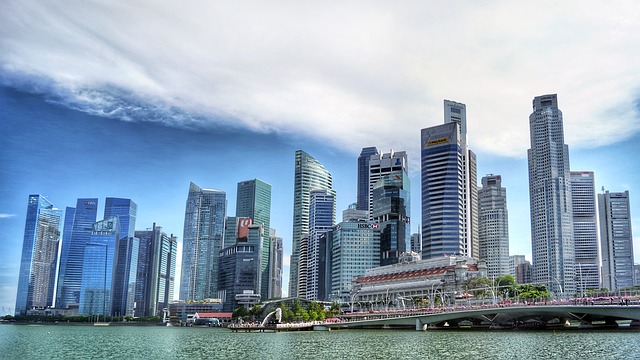


Related Post
Spot the 5 Best Countries to Visit in November for A Winter Trip
Best Countries to Visit in October 2025 For A Family Trip
Reveal The Best Countries To Visit In September 2025 For A Perfect Vacation
Pin Down the 6 Best Countries to Visit in August 2025 With Your Family
Guide to Marine Life in Andaman and Nicobar Islands
Kumbh Mela 2025 Date & Place: Full Schedule, Location & Travel Tips
Everything About the Next Maha Kumbh Mela 2025 – Dates & Travel Tips
Places to Visit in Varanasi: A First-Timer's Guide to the Holy City
10 Best Places to Visit in April Outside India – Where Will You Go Next?
10 Facts About Kashmir Valley: Kashmir Weather, History, Culture and More